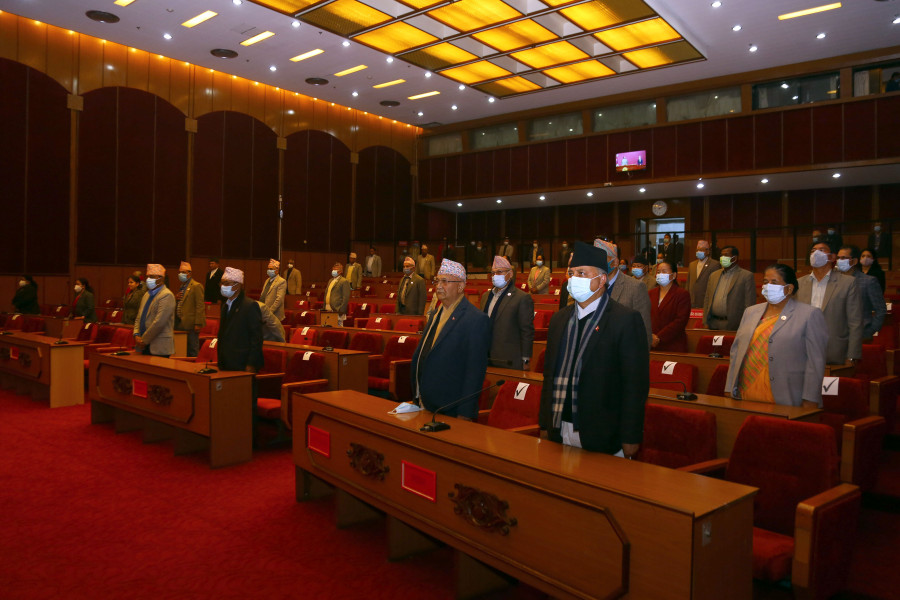National
With upper house prorogued, two key aviation bills left in the lurch
Experts say it may now take another four to five years to get Nepal removed from the European Union air safety list.
Sangam Prasain
Two crucial aviation bills that needed to be passed to get Nepal removed from the European Union Air Safety blacklist have been left in the lurch after the National Assembly was prorogued on Sunday.
A prerequisite to getting Nepal back in the good books is splitting the Civil Aviation Authority of Nepal into two entities to facilitate stringent enforcement of safety measures.
President Bidya Devi Bhandari prorogued the seventh session of the National Assembly on the recommendation of the KP Sharma Oli government on Sunday morning.
With the lower house dissolved and midterm elections declared, there are concerns about political uncertainty in the country, which could mean a further delay in the endorsement of the two key pieces of legislation being shelved indefinitely.
The civil aviation body had hoped that the upper house would pass the bills permitting the creation of two entities—service provider and regulator—even though the lower house had been dissolved.
Aviation experts said that based on the current 'fluid political situation', work to get Nepal removed from the EU air safety list, better known as the EU blacklist, may take another four to five years.
The European Commission, the lawmaking body of the EU, had asked that Nepal’s civil aviation body be fragmented with a clear demarcation of its powers and responsibilities because its dual functions gave rise to a conflict of interest.
“The issue of creating laws to split the civil aviation body is not in our hands. Lawmakers make the laws,” said Rajan Pokhrel, director general of the Civil Aviation Authority of Nepal.
The current political situation following the dissolution of the lower house on December 20 had made things bad, but Sunday’s development made them worse, according to officials at the civil aviation body.
Pokhrel admitted that things are uncertain now.
The European Commission has continued its ban on Nepali airlines for eight consecutive years through an updated EU Air Safety List published on December 2.
On December 5, 2013, the Commission had imposed a blanket ban on all airlines from Nepal from flying into the EU.
Nepal has yet to fulfil its pledge to break up the civil aviation body into two entities in order to be delisted by the EC.
“Passage of the bills has become uncertain once again. I don’t think the government will take the aviation issue seriously at this time of political uncertainty,” said Sanjiv Gautam, former director general of the Civil Aviation Authority of Nepal.
“Based on the current situation, it may take another four years for Nepal to get removed from the EU’s bad books.”
Gautam said as the bills had been tabled at the upper house, they have been immobilised following the decision to prorogue it. “No one is sure when the House will resume. Everything is uncertain.”
He said when there is no House session, the government has an option to take the ordinance route to pass the key pieces of legislation.
“But since the lower house is dissolved and the upper house session has just been prorogued, there is confusion over the next move,” said Guatam.
Last year too, the Oli administration had abruptly decided to prorogue Parliament, which was largely guided by internal problems in the ruling Nepal Communist Party, which left the two bills in limbo.
Civil aviation officials were optimistic that as the Legislation Management Committee of the upper house had already passed the bills, it would not take much time for them to be registered at the lower house for deliberation and approval. The two pieces of legislation will become law after they are signed by the President.
The government has been working on the proposed legislation for the last 10 years, and it has been held up by the bureaucracy at every step.
While the European Union applauded the Nepal government’s firm commitment to improve its air safety mechanism, the lawmaking body—the European Commission—has questioned the issuance of air operator certificates to new Nepali carriers without sufficient compliance with international safety standards.
The ban on airlines from Nepal from flying to Europe for their failure to adhere to safety standards has entered its eighth year.
On December 7, coinciding with International Civil Aviation Day, the EU said that it was aware of the efforts made by Nepal, notably with regard to a new aviation bill before Parliament.
“It would be key for this legislation to be adopted by Parliament and subsequently implemented,” said the Delegation of the European Union to Nepal in a statement. “This would allow the Commission to advance with the process of eventually removing Nepal from the EU Air Safety List.”
Based on this announcement, the then civil aviation minister Yogesh Bhattarai lost no time in proclaiming that Nepali carriers would soon be removed from the EU Air Safety List as there had been progress in splitting the Civil Aviation Authority of Nepal.
The Civil Aviation Authority of Nepal Bill and the Air Service Authority of Nepal Bill, proposing to separate the aviation body, were at the final stages of being passed by the National Assembly during the budget session of the federal parliament that ended on July 2 last year.
But the government’s abrupt decision to prorogue Parliament left the two bills in an uncertain state.
Following pressure from a number of global aviation watchdog groups, the Cabinet had given the go-ahead to the Civil Aviation Ministry in July last year to draft two separate bills to split up the Civil Aviation Authority.




 13.12°C Kathmandu
13.12°C Kathmandu














